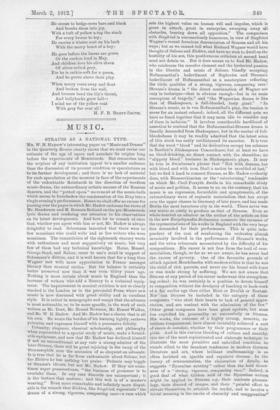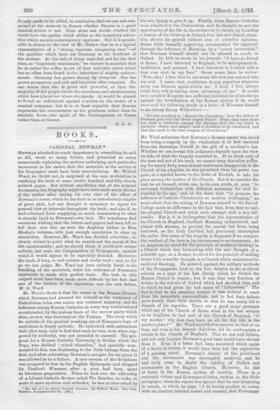MUSIC.
STRAUSS AS A NATIONAL TYPE.
Ma. W. H. Hamow's interesting paper on "Music and Drama" in the Quarterly Review clearly shows that we must revise our estimate of the age of opera and antedate its origins long before the experiments of Monteverde. But researches into the engines of any institution appeal to a smaller audience than the discussion of its present condition or speculations as to its further development ; and there is no lack of material for such speculation at the moment in face of the experiments of the redoubtable Reinhardt in the direction of wordless music-drama, the extraordinary artistic success of the Russian -dancers, and the "potted opera" movement at the music-balls which seems to foreshadow the condensation of the Ring into a single evening's performance. Hence we shall offer no excuse for passing over the pages in which Mr. Hadow endorses the views of Mr. Henderson and M. Remain Rolland on the pre-Monteverde lyric drama and confining our attention to his observations on its latest developments. And here let us remark at once that, whether you agree with him or not, Mr. Hadow is always delightful to read. Schumann lamented that there were so few musicians who could write and so few writers who were musicians. The romanticists of the eighteenth century wrote with enthusiasm and most suggestively on Music, but very few of them had any technical knowledge. Heine, Musset, George Sand, and Balza°, recur to one's mind in support of Schumann's dictum, and it is well known that for a long time Wagner met with more appreciation in France amongst literary than musical circles. But the balance is certainly better preserved now than it was even thirty years ago. Nothing is more certain about music in England than the increase of writers who add a literary to a technical equip- ment. The improvement in musical criticism is not so clearly marked in the London as in the provincial Press, where new music is now discussed with great ability and in excellent style. It is rather in monographs and essays that the advance is most noticeable, or, to be more specific, in the work of such writers as Mr. Dent, Mr. Ernest Newman, Mr. Ernest Walker, and Mr. W. H. Hadow. And Mr. Hadow has a charm that is all his own. He wears the burden of his learning lightly, eschews polemics, and expresses himself with a persuasive felicity. Urbanity, elegance, classical scholarship, and philosophy when superadded to a special study of music, make a formid- able equipment, and now that Mr. Hadow has declared himself if not an unconditional at any rate a strong admirer of the later Strauss, there will be great rejoicing in the camp of the Straussophils over the accession of so eloquent an advocate. It is true that he is far from enthusiastic about Salome, but for Biafra he has nothing but praise. Pedants may boggle at Strauss's idioms, but not Mr. Hadow. If they are some- times super grammaticaM, "the business of grammar is to overtake them. In any case discords are unimportant ; it is the texture that matters ; and this web is of a master's weaving." Even more remarkable and infinitely more disput- able is the remark that Elektra, like Siegfried, represents "the drama of a strong, vigorous, conquering race—a race which sets the highest value on human will and impulse, which is great in attack, great in enterprise, sweeping away tell obstacles, bearing down all opposition." The comparison with Siegfried is unconsciously humorous, in view of Siegfried Wagner's recent ferocious denunciation of Strauss and all his ways ; but as we cannot tell what Richard Wagner would have thought of Salome and Elektra, and have no wish to dwell on the hostility of his son, this posthumous criticism-at second hand need not detain us. But it does amaze us to find Mr. Hadow, who condemns the macabre element and the hysterical passion in the libretto and music of Salome, blandly accepting Holinannstlud's bedevilment of Sopboeles and Strauss's bedevilment of Hofmannsthal as a masterpiece reflecting the virile qualities of a strong, vigorous, conquering race ! Strauss's drama is " the direct continuation of Wagner not only in technique—that is obvious enough—but in its main conception of tragedy," and "the Wagnerian drama is like that of Shakespeare, a full-blooded, lusty giant." "In Strauss's music, as in von Hofmannsthal's play, the tension is never for an instant relaxed; indeed, all the different arts we have so fused together that it may seem idle to consider any of them in isolation." It involves considerable hardihood of assertion to contend that the Hofmannsthal-Strauss drama is lineally descended from Shakespeare, but in the matter of full- bloodedness it may be readily admitted that the latest scion of this stock has eagly outdistanced its ancestor. It is true that the word "blood" and its derivatives occupy ten columns in Bartlett's Shakespeare Concordance, but at least we have no blood-drinking, no direct contact with the shambles; no "slippery blood" business in Shakespeare's plays. It may be true in Swinburne's phrase that "Not with dreams, but with blood and with iron, Shall a nation be moulded at last," but we find it bard to connect Strauss, as Mr. Hadow evidently does, with Biemarekianism or the " exteriorising" tendencies on which Mr. Cecil Forsyth dwells in his remarkable study of music and politics. It seems to us, on the contrary, that his music is an expression, formidable and symptomatic, of the extraordinary wave of orgiastic materialism that has swept over the upper classes in Germany of late years, and has made Berlin the most luxurious city in the world. There never was any music so costly to produce as that of Strauss. Even so whole-hearted an admirer as the author of the article on him in the new Encyclopaedia Britannica connects the rareness of the representations of his works in England with the very large fees demanded for their performance. This is quite inde- pendent of the cost of reinforcing the orchestra almost invariably involved in the performance of Strauss's works, and the extra rehearsals necessitated by the difficulty of his compositions. His career is not free from the trail of com- mercialism, though, so far as we are aware, be has never had the excuse of poverty. One of the favourite grounds of attack against Mendelssolm with modern critics is that he was the child of rich parents, and never ate his bread with tears or was made strong by suffering. We are not aware that Strauss at any period of his career underwent this strengthen- ing ordeal: he was certainly in a position to devote himself to composition without the drudgery of teaching or back-work at a far earlier age than either Bizet or Dvoltik or Brahma. Nor can Strauss be included in the category of those composers "who steel their hearts to lack of general appre- ciation, and are content with the admiration of the few." Other great composers have been great egotists, but none has exploited his personality so successfully as Strauss. His works, the outcome of a highly strung, neurotic, re- bellious temperament, have almost invariably achieved a sort of succes de scandale, whether by their programmes or their plots. And in this curious blending of culture and anarchy, this use of the most sophisticated and elaborate technique to illustrate the most primitive and unbridled emotions, he stands allied to the decadent tendencies in modern German literature and art, where brilliant craftsmanship is so often lavished on ignoble and repulsive themes. In the luxury of ornamentation, the elaboration of details, . he suggests "Byzantine subtlety" rather than the bold direct- ness of a "strong, vigorous, conquering race." Indeed, :Xi good deal of what Gibbon said of the Byzantine write: might be applied to Strauss, e.g., their intricate phraseo- logy, their discord of images, and their "painful effort to elevate themselves, to astonish the reader, and to involve a trivial meaning in the smoke of obscurity and exaggeration?'
It-only needs to be added, in conclusion, that we are not con- cerned at the moment to discuss whether Strauss is a great musicatgenius or not. Time alone can decide whether his works have the quality which abides or the transitory attrac- tion which secures contemporary applause. But it is peril/is- Bible to demur to the view of Mr. Hadow that he is a typical representative of a -" strong, vigorous, conquering race"—of the qualities whiCh have set Germany in the forefront of the nations. At the risk of being regarded, not for the first time, as "hopelessly reactionary," we venture to maintain that be is rather the reflex in art of that hubristic strain which has so often- been found in the inheritors of mighty achieve- ments. Germany has grown strong by conquest. She has grown prosperous and rich and luxurious after conquest. No one denies that she is great and powerful, or that the majority of her people retain the soundness and strenuousness which have placed her where she stands. It would be absurd to found an indictment against a nation on the scores of a musical composer, but it is at least arguable that Strauss .represents the excrescences on her greatness rather than its intrinsic force—the spirit of the Carthaginians at Capua rather than at Canme.
C. L. G.











































 Previous page
Previous page